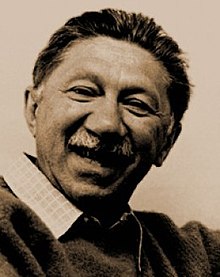
Back Abraham Maslow AF أبراهام ماسلو Arabic ابراهام ماسلو ARZ Abraham Maslow AST Abraham Maslou AZ آبراهام مزلو AZB Абрахам Маслоу BA Ейбрахам Маслоу Bulgarian আব্রাহাম মাসলো Bengali/Bangla Abraham Maslow Catalan
Abraham Maslow | |
|---|---|
 | |
| Born | April 1, 1908 Brooklyn, New York City, U.S. |
| Died | June 8, 1970 (aged 62) Menlo Park, California, U.S. |
| Education | City College of New York Cornell University University of Wisconsin |
| Known for | Maslow's hierarchy of needs |
| Spouse |
Bertha Goodman Maslow
(m. 1928) |
| Children | 2 |
| Scientific career | |
| Fields | Psychology |
| Institutions | |
| Doctoral advisor | Harry Harlow |
Abraham Harold Maslow (/ˈmæzloʊ/ MAZ-loh; April 1, 1908 – June 8, 1970) was an American psychologist who created Maslow's hierarchy of needs, a theory of psychological health predicated on fulfilling innate human needs in priority, culminating in self-actualization.[1] Maslow was a psychology professor at Brandeis University, Brooklyn College, New School for Social Research, and Columbia University. He stressed the importance of focusing on the positive qualities in people, as opposed to treating them as a "bag of symptoms".[2] A Review of General Psychology survey, published in 2002, ranked Maslow as the tenth most cited psychologist of the 20th century.[3]
- ^ "Dr. Abraham Maslow, Founder Of Humanistic Psychology, Dies". The New York Times. June 10, 1970. Archived from the original on September 3, 2016. Retrieved September 26, 2010.
Dr. Abraham Maslow, professor of psychology at Brandeis University in Waltham, Mass., and founder of what has come to be known as humanistic psychology, died of a heart attack. He was 62 years old.
- ^ Hoffmann (1988), p. 109.
- ^ Haggbloom, Steven J.; Warnick, Renee; Warnick, Jason E.; Jones, Vinessa K.; Yarbrough, Gary L.; Russell, Tenea M.; Borecky, Chris M.; McGahhey, Reagan; et al. (2002). "The 100 most eminent psychologists of the 20th century". Review of General Psychology. 6 (2): 139–152. CiteSeerX 10.1.1.586.1913. doi:10.1037/1089-2680.6.2.139. S2CID 145668721. Archived from the original on October 3, 2018. Retrieved June 9, 2015.